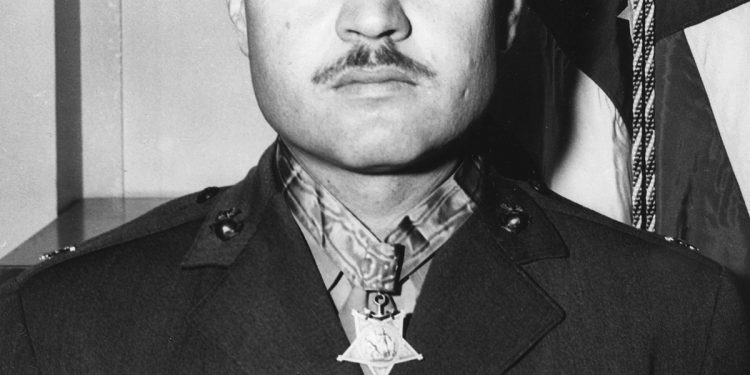Gregory Boyington, who often went by the name “Pappy” because he was much older than the men he commanded, was a US Marine Corps fighter ace in World War II. His tenacity as a child shaped his career as a fighter pilot and earned him the nation’s highest award for valor in combat, the Medal of Honor.
Boyington was born on December 4, 1912, in Idaho. He was raised with the surname Hallenbeck after his stepfather, though Boyington would be unaware of his biological identity until much later in life. As a child, Boyington was fascinated by World War I aviation heroes such as Frank Luke and Eddie Rickenbacker. He was inspired by model airplanes and often crafted his own. His interest furthered when American aviator Clyde Pangborn let Boyington and a friend in his aircraft for $5 if they would throw brochures down on the town below, which the young boys gladly accepted. It was often noted that as a child, Boyington developed an attitude of fortitude and perseverance. His inclination for aircraft stayed with him throughout his childhood and shaped the rest of his adult life.
Boyington began college at the University of Washington in 1930. He participated in ROTC, wrestling, and swimming, and was a member of the Lambda Chi Alpha fraternity. In 1934, he was commissioned as second lieutenant in the Coast Artillery Reserve and served at Fort Worden in Washington. The same year he graduated college with a degree in aeronautical engineering and married Helene Clark. Boyington began working for The Boeing Company but found himself unhappy and struggling financially.
Boyington picked up an application for a fight instruction program passed under the Aviation Cadet Program Act in 1935. It required that participants remain single for the duration of the program, but because Boyington and his wife were soon expecting the birth of their child, he decided to move forward with applying anyway. Needing a birth certificate to submit with his application, Boyington’s mother was forced to admit that he was really a Boyington, not a Hallenbeck. This worked in his favor, as he could apply for the program under his real name, Gregory Boyington, which had no record of marriage. He was then admitted as an aviation cadet with the US Marine Corps.
Boyington served in the US Marine Corps Reserve until 1941, when he resigned to join the American Volunteer Group, famously nicknamed the Flying Tigers, to aid China in their fight against Japan. He and his squadron were deployed to Burma in November of 1941. He was credited with downing two enemy aircraft before returning to the United States. By 1942, Boyington rejoined the US Marine Corps Reserve as the United States had officially entered World War II.
The now-Major Boyington was deployed to the Solomon Islands in the South Pacific where he commanded several fighter squadrons. Under Major Boyington’s leadership from September 12, 1943, to January 3, 1944, the “Black Sheep” squadron, which gained its name from the various backgrounds of its pilots, fiercely battled Japanese forces on numerous occasions resulting in American aerial victories. Major Boyington alone downed 26 Japanese aircraft. The Black Sheep squadron’s streak of aerial achievements came to a halt when Major Boyington was shot down by Japanese forces over Rabaul in the morning hours of January 3, 1944. He ejected over water and hoped that a coast watcher would locate him, but he instead was picked up by a Japanese submarine. He was declared missing and remained in captivity in various prisoner-of-war camps until the end of the war, approximately 19 months.
While Boyington was imprisoned by the Japanese, he had been nominated for the Medal of Honor for the series of aerial operations he completed with the Black Sheep squadron in the Solomon Islands prior to his captivity. Notably, he was awarded the Medal for a period of actions as opposed to a single act or acts as outlined in the Medal criteria. His mother, Grace, accepted the Medal on his behalf from President Franklin D. Roosevelt in 1944, at a ceremony at the White House.
Once back in the United States after the war was over, Boyington was met with fame. His aerial victory tally raised from 26 to 28 as two additional enemy kills were confirmed after his disappearance almost two years prior. Because he was now physically accounted for, Boyington was able to accept the Medal of Honor himself. On October 5, 1945, President Harry Truman presented Lieutenant Colonel Boyington (who received a promotion while in captivity) along with 13 other service members, with the Medal. He retired from the US Marine Corps Reserves shortly after, in 1947.
The great Marine ace’s newfound fame was quickly diluted by financial turmoil, love affairs, and alcoholism, which he attempted to treat but occasionally indulged in. For the remainder of his life, Boyington worked numerous jobs, including some in the aviation industry. In 1958 he first released a memoir entitled Baa Baa Black Sheep. His book release was so popular that it was dramatized into a television series, which ran for two years. Boyington’s legacy inspired numerous other novels and media productions. At the age of 75, Boyington passed away from lung cancer in 1988. He had three children and widowed his fourth wife.
Kacie Howard is the Museum Content Intern at the National Medal of Honor Museum

















